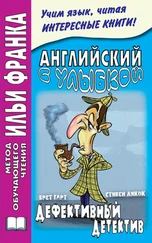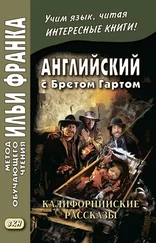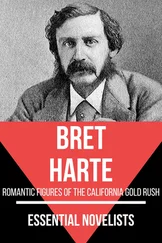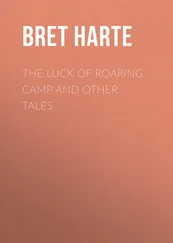Bret Harte - Gabriel Conroy
Здесь есть возможность читать онлайн «Bret Harte - Gabriel Conroy» — ознакомительный отрывок электронной книги совершенно бесплатно, а после прочтения отрывка купить полную версию. В некоторых случаях можно слушать аудио, скачать через торрент в формате fb2 и присутствует краткое содержание. Жанр: foreign_prose, foreign_adventure, на английском языке. Описание произведения, (предисловие) а так же отзывы посетителей доступны на портале библиотеки ЛибКат.
- Название:Gabriel Conroy
- Автор:
- Жанр:
- Год:неизвестен
- ISBN:нет данных
- Рейтинг книги:4 / 5. Голосов: 1
-
Избранное:Добавить в избранное
- Отзывы:
-
Ваша оценка:
- 80
- 1
- 2
- 3
- 4
- 5
Gabriel Conroy: краткое содержание, описание и аннотация
Предлагаем к чтению аннотацию, описание, краткое содержание или предисловие (зависит от того, что написал сам автор книги «Gabriel Conroy»). Если вы не нашли необходимую информацию о книге — напишите в комментариях, мы постараемся отыскать её.
Gabriel Conroy — читать онлайн ознакомительный отрывок
Ниже представлен текст книги, разбитый по страницам. Система сохранения места последней прочитанной страницы, позволяет с удобством читать онлайн бесплатно книгу «Gabriel Conroy», без необходимости каждый раз заново искать на чём Вы остановились. Поставьте закладку, и сможете в любой момент перейти на страницу, на которой закончили чтение.
Интервал:
Закладка:
Harte Bret
Gabriel Conroy
BOOK I.
ON THE THRESHOLD
CHAPTER I.
WITHOUT
Snow. Everywhere. As far as the eye could reach – fifty miles, looking southward from the highest white peak, – filling ravines and gulches, and dropping from the walls of cañons in white shroud-like drifts, fashioning the dividing ridge into the likeness of a monstrous grave, hiding the bases of giant pines, and completely covering young trees and larches, rimming with porcelain the bowl-like edges of still, cold lakes, and undulating in motionless white billows to the edge of the distant horizon. Snow lying everywhere over the California Sierras on the 15th day of March 1848, and still falling.
It had been snowing for ten days: snowing in finely granulated powder, in damp, spongy flakes, in thin, feathery plumes, snowing from a leaden sky steadily, snowing fiercely, shaken out of purple-black clouds in white flocculent masses, or dropping in long level lines, like white lances from the tumbled and broken heavens. But always silently! The woods were so choked with it – the branches were so laden with it – it had so permeated, filled and possessed earth and sky; it had so cushioned and muffled the ringing rocks and echoing hills, that all sound was deadened. The strongest gust, the fiercest blast, awoke no sigh or complaint from the snow-packed, rigid files of forest. There was no cracking of bough nor crackle of underbrush; the overladen branches of pine and fir yielded and gave way without a sound. The silence was vast, measureless, complete! Nor could it be said that any outward sign of life or motion changed the fixed outlines of this stricken landscape. Above, there was no play of light and shadow, only the occasional deepening of storm or night. Below, no bird winged its flight across the white expanse, no beast haunted the confines of the black woods; whatever of brute nature might have once inhabited these solitudes had long since flown to the lowlands.
There was no track or imprint; whatever foot might have left its mark upon this waste, each succeeding snow-fall obliterated all trace or record. Every morning the solitude was virgin and unbroken; a million tiny feet had stepped into the track and filled it up. And yet, in the centre of this desolation, in the very stronghold of this grim fortress, there was the mark of human toil. A few trees had been felled at the entrance of the cañon, and the freshly-cut chips were but lightly covered with snow. They served, perhaps, to indicate another tree "blazed" with an axe, and bearing a rudely-shaped wooden effigy of a human hand, pointing to the cañon. Below the hand was a square strip of canvas, securely nailed against the bark, and bearing the following inscription —
Captain Conroy's party of emigrants are lost in the snow, and camped up in this cañon. Out of provisions and starving!
Left St. Jo, October 8th, 1847.
Left Salt Lake, January 1st, 1848.
Arrived here, March 1st, 1848.
Lost half our stock on the Platte.
Abandoned our waggons, February 20th.
Joel McCormick, Jane Brackett,
Peter Dumphy, Gabriel Conroy,
Paul Devarges, John Walker,
Grace Conroy, Henry March,
Olympia Conroy, Philip Ashley,
Mary Dumphy.
Mamie died, November 8th, Sweetwater.
Minnie died, December 1st, Echo Cañon.
Jane died, January 2nd, Salt Lake.
James Brackett lost, February 3rd.
The language of suffering is not apt to be artistic or studied, but I think that rhetoric could not improve this actual record. So I let it stand, even as it stood this 15th day of March 1848, half-hidden by a thin film of damp snow, the snow-whitened hand stiffened and pointing rigidly to the fateful cañon like the finger of Death.
At noon there was a lull in the storm, and a slight brightening of the sky toward the east. The grim outlines of the distant hills returned, and the starved white flank of the mountain began to glisten. Across its gaunt hollow some black object was moving – moving slowly and laboriously; moving with such an uncertain mode of progression, that at first it was difficult to detect whether it was brute or human – sometimes on all fours, sometimes erect, again hurrying forward like a drunken man, but always with a certain definiteness of purpose, towards the cañon. As it approached nearer you saw that it was a man – a haggard man, ragged and enveloped in a tattered buffalo robe, but still a man, and a determined one. A young man despite his bent figure and wasted limbs – a young man despite the premature furrows that care and anxiety had set upon his brow and in the corners of his rigid mouth – a young man notwithstanding the expression of savage misanthropy with which suffering and famine had overlaid the frank impulsiveness of youth. When he reached the tree at the entrance of the cañon, he brushed the film of snow from the canvas placard, and then leaned for a few moments exhaustedly against its trunk. There was something in the abandonment of his attitude that indicated even more pathetically than his face and figure his utter prostration – a prostration quite inconsistent with any visible cause. When he had rested himself, he again started forward with a nervous intensity, shambling, shuffling, falling, stooping to replace the rudely extemporised snow-shoes of fir bark that frequently slipped from his feet, but always starting on again with the feverishness of one who doubted even the sustaining power of his will.
A mile beyond the tree the cañon narrowed and turned gradually to the south, and at this point a thin curling cloud of smoke was visible that seemed to rise from some crevice in the snow. As he came nearer, the impression of recent footprints began to show; there was some displacement of the snow around a low mound from which the smoke now plainly issued. Here he stopped, or rather lay down, before an opening or cavern in the snow, and uttered a feeble shout. It was responded to still more feebly. Presently a face appeared above the opening, and a ragged figure like his own, then another, and then another, until eight human creatures, men and women, surrounded him in the snow, squatting like animals, and like animals lost to all sense of decency and shame.
They were so haggard, so faded, so forlorn, so wan, – so piteous in their human aspect, or rather all that was left of a human aspect, – that they might have been wept over as they sat there; they were so brutal, so imbecile, unreasoning and grotesque in these newer animal attributes, that they might have provoked a smile. They were originally country people, mainly of that social class whose self-respect is apt to be dependent rather on their circumstances, position and surroundings, than upon any individual moral power or intellectual force. They had lost the sense of shame in the sense of equality of suffering; there was nothing within them to take the place of the material enjoyments they were losing. They were childish without the ambition or emulation of childhood; they were men and women without the dignity or simplicity of man and womanhood. All that had raised them above the level of the brute was lost in the snow. Even the characteristics of sex were gone; an old woman of sixty quarrelled, fought, and swore with the harsh utterance and ungainly gestures of a man; a young man of scorbutic temperament wept, sighed, and fainted with the hysteria of a woman. So profound was their degradation that the stranger who had thus evoked them from the earth, even in his very rags and sadness, seemed of another race.
Читать дальшеИнтервал:
Закладка:
Похожие книги на «Gabriel Conroy»
Представляем Вашему вниманию похожие книги на «Gabriel Conroy» списком для выбора. Мы отобрали схожую по названию и смыслу литературу в надежде предоставить читателям больше вариантов отыскать новые, интересные, ещё непрочитанные произведения.
Обсуждение, отзывы о книге «Gabriel Conroy» и просто собственные мнения читателей. Оставьте ваши комментарии, напишите, что Вы думаете о произведении, его смысле или главных героях. Укажите что конкретно понравилось, а что нет, и почему Вы так считаете.












